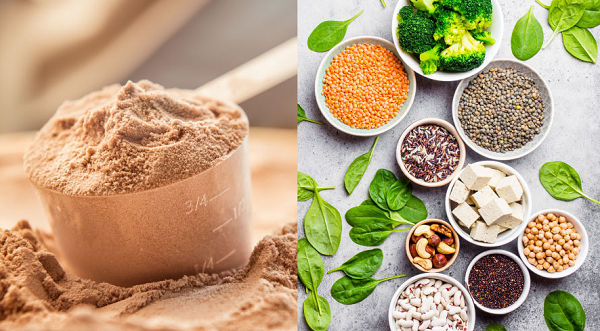Are you a vegetarian struggling to meet your daily protein requirements? Or maybe you’re considering going vegetarian but worried about getting enough protein. Well, the truth is that not all vegetarian protein sources are created equal and some may not provide the complete amino acid profile your body needs. In this blog post, we’ll uncover the facts behind vegetarian protein sources and help you understand why you may not be getting enough. So grab a cup of tea, sit back, and let’s dive in!

What is vegetarian protein?
There is a lot of debate surrounding the topic of vegetarian protein sources. Many people believe that plant-based proteins are not as good as animal-based proteins, and that you need to include some form of animal protein in your diet in order to get the full nutritional benefits. However, there are many plant-based proteins that are considered to be adequate and complete sources of nutrition for vegetarians.
Some common vegetarian protein sources include beans, lentils, peas, nuts, seeds, tofu, seitan (a meat substitute made from wheat gluten), and tempeh (a fermented soy product). These foods provide all the essential amino acids necessary for human health, as well as fiber and other nutrients. They are also low in calories and cholesterol-free. In addition, they can be used to create vegetarian versions of popular meat dishes.
Why vegetarians need more protein
People who follow a vegetarian or vegan diet often worry about getting enough protein. While plant-based proteins do provide some important nutrients, they are not always as complete as those found in meat. That’s why vegetarians and vegans need to be especially careful about the kind of protein they consume.
When it comes to meeting your protein needs, animal proteins are generally more complete than plant-based proteins. This is because animal-based proteins contain all 23 of the essential amino acids, while most plant-based proteins only contain 10 or 12 of them. Additionally, many plant-based foods are low in iron and zinc, which can also be limiting when it comes to getting enough protein.
So what should vegetarians and vegans do to get enough protein? The best way to ensure you’re getting the right amount is to combine different types of protein sources throughout the day. Some good options include combining legumes (beans, lentils), nuts, seeds, yogurt, and tofu. You can also add extra calcium and vitamin D from supplements if you feel like you’re not getting enough from your diet.
The best vegetarian protein sources
There are plenty of plant-based proteins you can eat if you’re a vegetarian or vegan, but some might not be as well known as others. Here are five of the best vegetarian protein sources:
1. Tofu
Tofu is a great option for vegetarians and vegans because it’s made from soybeans, which are a type of legume. Soybeans are high in fiber and protein, making tofu a complete protein. You can find tofu in many different types, flavors, and textures, so it’s sure to offer something for everyone.
2. Quinoa
Quinoa is another great source of vegetarian protein. It’s an ancient seed from South America that is high in fiber and nutrients. Like tofu, quinoa can be found in many different forms, including ground and whole grains. It can also be cooked into soups, salads, and even pancakes!
3. Almond milk
Almond milk is another great source of plant-based protein. It’s high in calcium and vitamin D, which are both important for vegetarians and vegans. You can use almond milk to make smoothies, oatmeal bars, yogurt bowls, energy bites, baking recipes—the possibilities are endless!
4. Legumes (including lentils)
Legumes are a great source of vegetarian protein because they’re packed with nutrients such as fiber and vitamins B6 and E. Lentils are especially good at
How to increase your intake of vegetarian protein
If you’re vegetarian, you may be wondering how to increase your intake of protein. Here are five vegetarian protein sources that can help:
1. Tofu
Tofu is a great source of plant-based protein and is versatile enough to be used in many different dishes. You can cook tofu in a variety of ways, including using it as a replacement for meat in dishes like stir-fries or tacos.
2. Quinoa
Quinoa is another great source of plant-based protein. It’s high in fiber and contains all eight essential amino acids, making it an ideal choice for vegetarians looking for a complete protein source. You can cook quinoa into pilafs, salads, or even tacos.
3. Broccoli
Broccoli is another vegetable that is packed with plant-based protein. Steam or eat broccoli raw as a salad option. Be sure to include other veggies such as carrots, tomatoes, and avocados to increase the nutritional value of your broccoli dish.
4. Hemp Seeds
Hemp seeds are another great source of plant-based protein and they have a number of health benefits associated with them, such as being high in omega-3 fatty acids and vitamins E and B12. You can use hemp seeds as part of breakfast cereals or add them to smoothies or yogurt for added nutrients and flavor.
5. Seitan
Seitan is made from wheat flour that’s been processed
Conclusion
vegetarian protein sources are a great way to get your daily dose of protein without having to eat meat. However, not all vegetarian varieties provide the same level of amino acids and nutrients as their meat counterparts. If you are considering switching to a vegetarian lifestyle, it is important to research which vegetarian proteins will give you the best results. Remember: if it doesn’t have a “meat” label, it may not be a good source of protein!